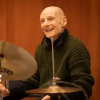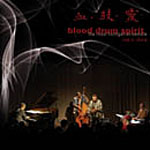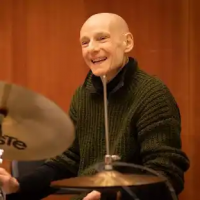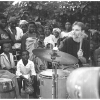Home » Jazz Musicians » Royal Hartigan
Royal Hartigan
Royal Hartigan is a percussionist, pianist, and tap dancer who has studied and performed the musics of Asia, Africa, Europe, West Asia, and the Americas as well as African American blues, gospel, funk, hip-hop, and jazz traditions. He was awarded an A.B. in philosophy from St. Michael's College in 1968, a BA in African American Music with honors from UMass Amherst, and M.A. and PhD degrees in world music and ethnomusicology at Wesleyan University in 1983 and 1986, studying intensively with ethnomusicologist David McAllester and Bill Lowe, Bill Barron, Edward Blackwell, Freeman Kwadzo Donkor, Abraham Kobena Adzenyah, and other master artists/scholars from Java, India, and Ghana, West Africa.
Royal has received many awards for global research, performance, and teaching. These include Healey and Whiting Award (2010), Asian Cultural Council Research Grant for the Philippines (2009), a J. William Fulbright Lecture/Research Award for the Philippines (2006) and Ghana, West Africa (2014-15), a New School University (NY) Dean’s Resident Master Artist Award (2005-06), and a Korean Foundation Fellowship (2001).
He is an endorsee for Vic Firth Sticks and Mallets, Istanbul Cymbals, and Remo drumheads. royal has taught ethnomusicology, African drumming, and world music ensemble at the New School University (formerly the New School for Social Research) in New York, Wesleyan University’s Graduate Liberal Studies program, San Jose State University, and is a retired full Professor at UMass Dartmouth.
His publications include Blood Drum Spirit: Drum Languages of West Africa, African America, Native America, Central Java, and South India, a 1700-page analysis of world drumming traditions (PAS archives); articles in Percussive Notes, World of Music, Annual Review of Jazz Studies, Music in China, and The African American Review; a book with compact disc, West African Rhythms for Drumset (Manhattan Music/Warner Brothers/Alfred 1995, 2004), named one of the top 25 percussion books in the history percussion publications by Modern Drummer Magazine, and two with digital video disc, Dancing on the Time (Tapspace 2006), and West African Eve Rhythms for Drumset (Print Tech 2011). He is completing a new book with DVD on African Music and Jazz (2019) and has given lectures and clinics on world music and jazz in Africa, China, the Philippines, Europe, and North America. royal travels to West Africa most summers to teach, perform, and do research, collaborating with master artists and the people of various villages, including the Dagbe Cultural Centre at Kopeyia Village, Volta Region, Ghana, the Dagara Music Centre in Midie, Ghana, and Mampong, Asante Region, Ghana.
Read moreTags
A Different Drummer, Part 2: Royal Hartigan

by Karl Ackermann
Drums of Life--Drums of DeathThe ruins of the Anasazi people stand undisturbed in the cliffs between the high mesas and the canyon floors of the southwest. Dating to 2500 B.C., the multi-story adobe pueblos and stone cities were the sites of the ancient indigenous peoples of North America. Archeologists have uncovered an assortment of percussion instruments in the ruins: suspended stones that resonated when struck, gourd rattles with seeds inside. Rasps were pieces of wood or bone with serrated edges ...
Continue ReadingRoyal Hartigan & Blood Drum Spirit: Time Changes

by Karl Ackermann
Drummer, pianist, and composer, Royal Hartigan, first encountered bassist Wes Brown and saxophonist David Bindman at Wesleyan University. The three were instrumental in the early development of the Ghanaian-American group Talking Drums and recorded Blood Drum Spirit (Innova) in 1993 with Kevin McNeal on guitar. The ensemble's follow up, Blood Drum Spirit: Royal Hartigan Ensemble Live in China—also on Innova—was not released until 2008, when pianist Art Hirahara had replaced McNeal. Time Changes is Hartigan's fourth double-CD as a leader ...
Continue ReadingRoyal Hartigan: Blood Drum Spirit

by Karl Ackermann
Good things sometimes fly under the radar; sometimes they are great things. This has never been more the case than with Royal Hartigans's Blood Drum Spirit, a jazz masterpiece that has languished in obscurity since its 1993 recording to its eventual 2004 release.
It remains largely unrecognized six years later. Jazz, especially in the US, can be almost religiously hierarchical and introducing an unknown quantity to the ranks of Miles Davis, John Coltrane, or Anthony Braxton may well be viewed ...
Continue ReadingRoyal Hartigan Honors Ancestors In Free Concert, May 5 In Pittsfield

Source:
Ed Bride Associates
Percussionist, author, activist, and Pittsfield (Mass.) native Royal Hartigan brings the Blood Drum Spirit ensemble to his home town, to honor his (and our) ancestors on Sunday, May 5, at 3 pm. The concert will take place at the Zion Lutheran Church at 74 First Street, Pittsfield. A free will offering is suggested and all proceeds from offerings will be donated to the Pittsfield Area Council of Congregations Emergency Fuel Fund and to Berkshires Jazz, Inc. Hartigan will be joined ...
read more
"Royal Hartigan's two-disc set Blood Drum Spirit draws its musical inspiration from the percussionist's travels and studies in far-flung places. A native of the Berkshires in Western Massachusetts, Hartigan integrates elements of the music of Ghana, India, and the Philippines as well as Native Americans into his compositions, using them to express his long-standing interests in multiple time signatures and polymeter. Unlike those who use world music as an exotic flavor, Hartigan integrates these influences deep within the structure of his pieces, which are an expression of a worldview that goes beyond music
Primary Instrument
Drums
Location
Boston
Willing to teach
Advanced only
Credentials/Background
As a musician, I know that the best learning comes from doing. In each of my workshops around the world or classes in the Music Department, College of Visual and Performing Arts, University of Massachusetts Dartmouth students clap, sing, dance, or drum as an essential part of our discussion, reading, listening, and viewing. It is not necessary to master each activity, but to experience the sound, movement, and group interaction intensively. When possible, artists from each style or culture area studied perform for and with the class to bring the roots of the sound and movement home. My workshops, both individual and with master artists, include: West African drumming, its connection to African American and other contemporary music, innovations in jazz performance, historical jazz drumset styles, rhythms from Asia, Africa, the Americas, Europe, and the Middle East adapted to drumset, new time and rhythmic concepts for drumset and jazz ensemble, African American expressions of culture, aesthetics, music, society, and politics, and music as philosophy. On a graduate or undergraduate level, our classes and workshops in African American music live out what we discuss: we clap, sing, and dance camp meeting ring shouts or Georgia Sea Islands pattin' Juba, construct a one-string diddly-bow, sing the blues, compose a rap and play/dance hip-hop beats, dance to reggae and scat sing in the bebop jazz style: all as part of understanding the resilience and power of African American traditions. In our world music and ethnomusicology workshops and classes, we perform Native American Iroquois, Navajo, Lakota, and Inuit rhythms, songs, and dances; Japanese taiko rhythms, Chinese Beijing and Cantonese opera patterns; Philippine kulintang gong and drum ensemble pieces; Turkish usul rhythmic cycles on the bendir frame drum; South Indian karnatak solkattu rhythmic vocables; Korean nong ak drum and gong ensemble patterns; Javanese gamelan compositions; Gaelic bodhran rhythms; European chamber and symphonic percussion pieces, Dominican merengue, Brazilian samba; Cuban guaguanco; American rudimental drumming; and West African songs, dances, and drum, bell, and rattle repertoire. I also teach piano and jazz improvisation, focusing on the African American tradition and its innovators, such as Louis Armstrong, Duke Ellington, Charlie Parker, Dizzy Gillespie, John Coltrane, Charles Mingus, and Ornette Coleman. The small and large jazz ensembles I work with play repertoire from the early 1920s through the present. We learn from the African American tradition and use its heritage of spontaneous aural interaction as a way to develop pieces and perform in the style of Duke Ellington, Charles Mingus, and Sun Ra. We deal with the cultural and social meaning of pieces in each era as a way to play diverse historical styles with integrity. Our ensembles at UMass Dartmouth also play original and historic compositions in the African American tradition with a strong emphasis on influences from Asian, African, and American cultures. Our Kekeli West African drum and dance ensemble performs the music and dance of the Eve, Fon, Ashanti, Ga, Dagomba, Dagarti, and other cultural groups. We are led in public concerts and workshops by master drummers such as Abraham Kobena Adzenyah, C.K. Ladzekpo, and Martin Kwaakye Obeng, and dancers Kwabena Boateng and Helen Mensah. In each area of teaching I am committed to understanding the beliefs, lifeways, and histories of peoples as an essential part of their music making. Charlie Parker's words, 'If you don't live it, it won't come out of your horn.' are true. Even in the classroom, we live the music as much as possible to feel it and find what it means to each of us.



























